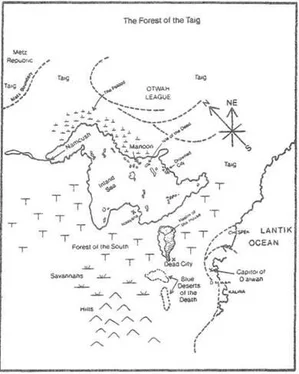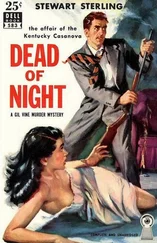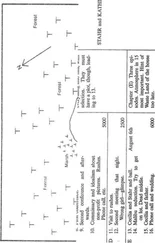Sometime later, the priest, idly glancing out to sea, reined his mount up sharply, making him snort with annoyance. Sorry, an accident, Hiero sent absently. Far out on the blue, wave-flecked water, two small, black triangles were outlined against the horizon. The ship was moving along in the same direction they were, the man decided after watching it for a few moments, but far faster. Also, it seemed to be going away as well as east, so that even as he watched, it sank below the edge of the sea.
As he rode on, he made a note to keep more of an eye seaward. A telescope could probably pick Klootz and his rider out a long way off, and he had no desire to end up in one of the pagan galleys he had read of, chained to an oar with a whip instead of meals. Also, the Unclean had ships too, of some curious types, and they were supposed to haunt little-used parts of the vast freshwater sea.
They were approaching a dark promontory of rock some hundreds of feet high which projected out into the water for a short distance when the noise first came to them. It was late afternoon by then, and they had seen nothing of note for a considerable time. Hiero was wondering how deep the choppy water was at the foot of the rock massif and whether the going would be safer, if more time-consuming, inland when the rattling, screeching cry, the noise of a bird redoubled tenfold, fell upon his ears. Again, and yet again, it rang out, and then he saw it.
Briefly, over the crest of the towering, jagged rock in front of them, soared a brown bird whose saillike wingspread could not have been less than thirty feet. Before it dipped down again on the far side of the peak, it opened its long, hook-tipped beak and let out a repetition of the scream he had just heard. Other echoing screams answered it, and told him that more than one of the great birds were aloft just out of sight.
Then, mingled with the rasping cries of the birds, an unmistakable drum thundered out, a long roll of muffled thunder. When it ceased, he heard the massed yelling of a horde of people mixed with the piercing cacophony of the birds. Again the great drum rumbled, silencing for a moment the other noises. This was the noise Hiero had heard the previous dawn!
By this time, at his master’s urging, Klootz was racing for the seaward base of the jutting rock. Behind him, tongue lolling out, Gorm galloped, laboring to keep up.
Not curiosity alone impelled Hiero to goad the morse on. The base of the rock was an obvious place to hide, should one of the huge birds sight him. The look of that immense hooked beak was dismaying, and the priest had no belief in his invulnerability from a flock of things that size.
Splashing through the shallows and circling the water-lapped boulders at the foot of the precipice, man and morse picked their way around the looming granite elbow and finally, both cautious, peered around the outer rim to see what had caused all the peculiar noises. Behind them, allowing them to brave whatever danger there might be, the young bear paused, waiting on events.
The first thing Hiero was conscious of was the stake and the girl; the next, the great birds; and last of all, the spectators. He did not at first notice the shaman, or witch doctor, and his crew.
A short stretch of curved beach sloped gently away from the sea, up to a high and artificial-looking bank of packed earth which backed the beach, cutting off any glimpse of further inland. A sort of arena, or amphitheater, was thus formed, one side wall being the cliff around which Hiero and Klootz now peered, the other being a similar, abrupt, rocky hillock a few hundred yards away. The sea, lapping at the white sand, formed the fourth side. The little beach was swept spotlessly clean, only the tall, wooden stake in the center interfering with the symmetry of the smooth, white sand.
Tied to the stake by a length of supple, twisted rawhide perhaps fifty feet long, was a very dark-skinned, almost naked girl. A scanty rag about her loins was her only garment, and her feet were bare. Her massed, tightly curling black hair tossed freely in the vigor of her movements. The rawhide was tied tightly to another lashing which secured both her wrists together in front of her. As a result, she could run, leap, dodge, or hide, turn or fall, but only in a fifty-foot arc around the wooden stake. She was doing all these things, her body a sweat-oiled blaze of dark movement as she sprang and crouched, ducked and spun, in her hopeless battle against the winged death.
The great birds! There were about eight of them, Hiero saw in one glance. Somewhat like giant gulls, but brown, not white, and with savage beaks, they circled and wove, always slashing down at the leashed prisoner. Like gulls too, their great feet were webbed, and thus they seemed only to use their murderous beaks as weapons. But that was enough. Despite her most desperate efforts, it was obvious the girl could only hold them off a little longer. As he watched, she scooped fine sand into her bound hands and hurled a cloud of it at the head of a swooping flier, which shied off with a scream of rage. But a long, bloody wound on her glistening back showed that the girl had not warded off all the attacks from above.
As the bird sheered off, the crowd let out a yell of derision. They made Hiero look at them then, with more than a passing glance. They sat in wicker-roofed lines of dirt seats, arranged in tiers on the earth back at the rear of the arena they had so obviously created. The roofs were not because of the sun, obviously, but rather to keep the birds from selecting an impromptu victim from among the screaming audience.
They were very light-skinned, Hiero saw, an archaic human stock he had only glimpsed among the southern traders once or twice, or else learned of through the old books, and many of them had light brown or even blondish hair. All, men, women, and children, seemed to be half-naked and all were armed, no doubt as extra insurance against the birds. They were waving every type of sword, spear, and axe as they yelled a raucous encouragement to the flying deaths.
To one side, a group of kilted men, hideously masked and with towering plumes of feathers, presided over a bank of giant, polished drums. These people had no protection from the birds and apparently no fear of them either. Now, as Hiero watched, they bent to their drums and, under the direction of the most gorgeously masked and feathered, the obvious high priest, beat out another rumbling roll of thunder on the tali, black cylinders. The audience screamed anew, and their cries were taken up by the birds, who swooped again, their shrieks drowning out the human yowling. Then, suddenly, all noise ceased, and the arena was silent in shocked surprise at what they now saw.
Hiero had ordered Klootz to charge and unlimbered the thrower almost without thinking. He also held two more of the tiny rockets in his mouth, praying he might get a chance to reload. As the bull morse tore out of the shallows and around the corner of the cliff, his rider noted in passing that a group of swarthy men, in good cloth clothes and leather hats quite unlike the rest of the audience, occupied the seats nearest to his end. Like all the others, they were gaping in amazement.
The great birds, seeing the charging bull and his rider as some terrible combined beast, flared lightly up like great feathers from their attempted kill. All except one, which was so intent upon the girl that it noticed nothing else.
She had fallen in a wild leap, and in falling had apparently knocked all her wind out. She was crawling, but as the bird sailed down, she seemed to sense it and turned face up with her bound hands raised in front of her.
She’s still trying to fight, the priest thought in admiration. That’s really a tough one. He was aiming his thrower as carefully as was possible, to intersect the great bird’s swoop, Practice over a long period of time in handling all of his weapons while mounted made this sort of thing a matter of trained reflex, but never exactly what could be called easy. One went through the proper motions and then simply prayed.
Читать дальше






